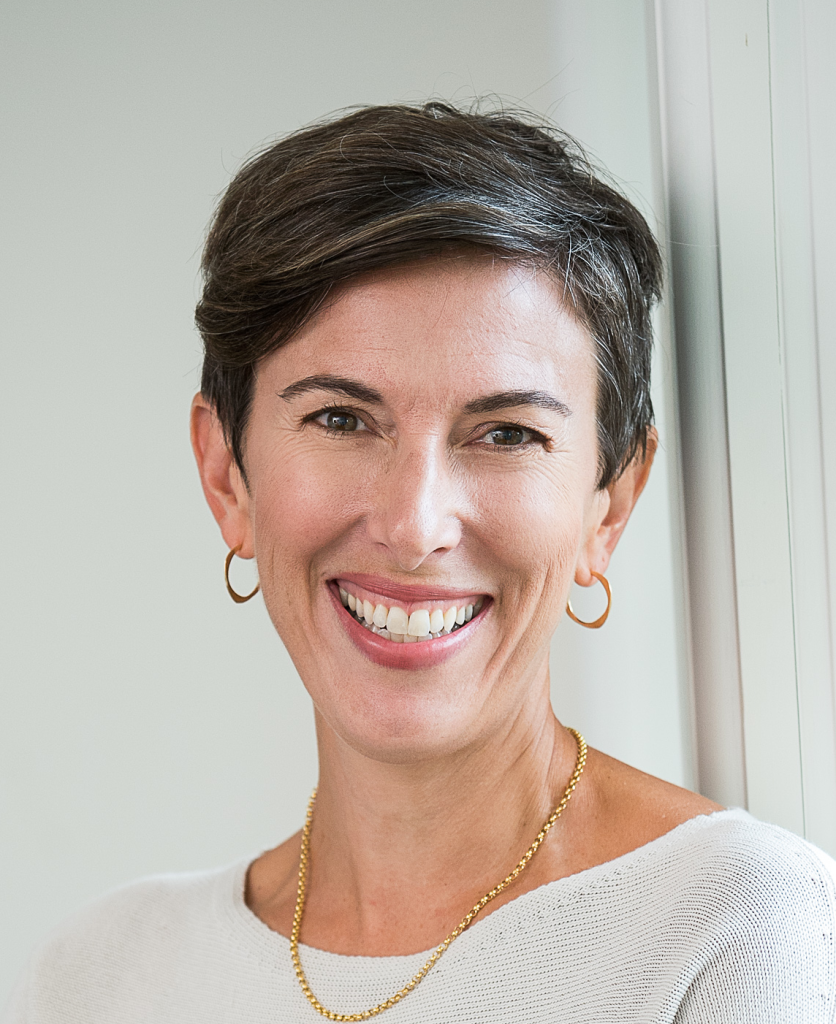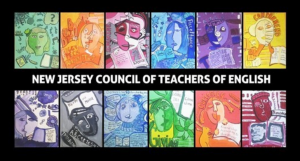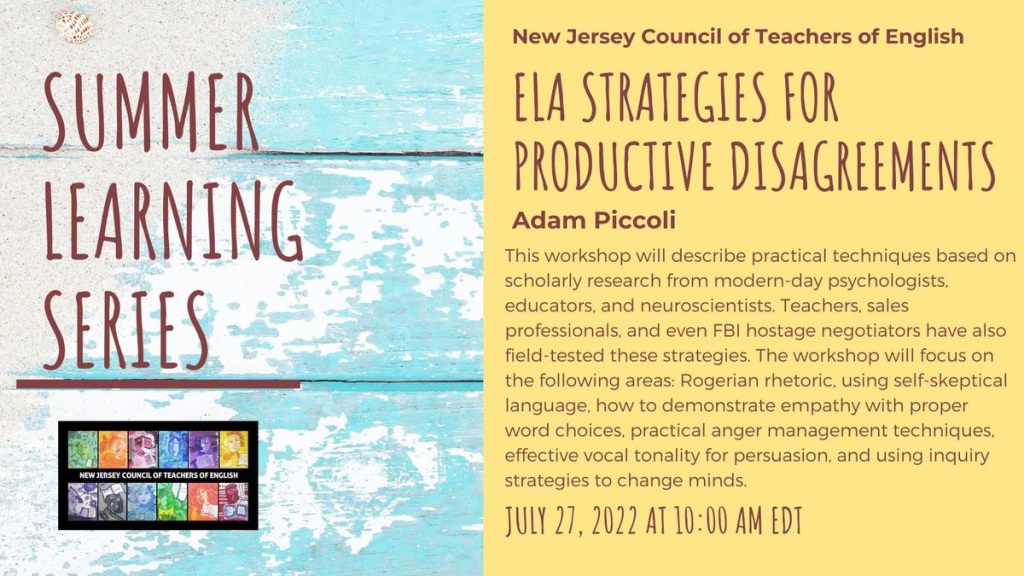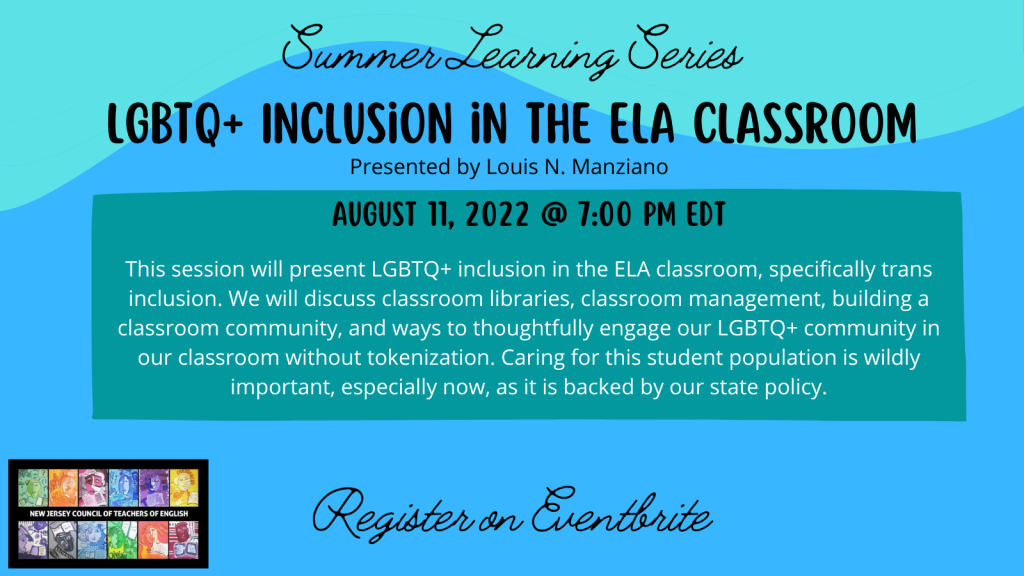Beat the heat this summer with lots of learning options to inspire you — our presenters are offering condensed, virtual versions of their spring conference sessions to benefit NJ educators this summer.
Join one, a few or all of the sessions — they are free to NJCTE members and only $5 for non-members! You can register for the sessions at the links below. Note that sessions will only run with five or more participants, so please be purposeful in your responses so that presenters can plan accordingly. We welcome your participation and enthusiasm at some or all of these awesome sessions this summer!
Thursday, July 16, 3pm, Janice Alvarez: This presentation will use various pieces of culturally responsive literature to demonstrate various lesson activities that will increase student motivation and achievement. Cornelius Minor’s book, We Got This, will be referenced and teachers will leave with tangible lesson ideas and a bibliography of culturally responsive and appropriate mentor texts.
Monday, July 20, 10am, Kristie-Anne Opaleski: There are a myriad of effective SEL programs available for the elementary and the middle school classrooms. However, options are limited for high school teachers though teens need this instruction equally, if not more. As the District SEL coordinator and instructional coach, I created SEL in the Secondary English Classroom for my high school colleagues encouraging them to try feasible and simple ways to integrate social-emotional learning in their English classes. Our district had a felt need at both high schools that all students, regardless of their academic level, needed coping skills; consequently, I created this Google Slide presentation as a springboard to start teaching SEL skills, specifically self-awareness and self-management to teens. The focus is on what teachers are already doing and capitalizing on ways to do it better. Most teachers care about their students, therefore some of these techniques are more of reminders than methods. I presented this to 40 high school English teachers and 95% of those surveyed felt like they could employ at least one of the strategies presented the next day.
Wednesday, July 22, 10:30am, Kate Overgaard: During this session, I will discuss the outline for implementing First Chapter Friday in classes, from elementary through college. The idea is to provide students with exposure to various texts and potentially open them up to different types of readings. I will share the list of readings used thus far and, provide sample lists for each grade level (elementary, middle, high school, college), etc.
Tuesday, July 28, 10am, Joe Pizzo: ELA Meets SEL 2.0 inspires ELA teachers to combine various strategies that infuse the fundamentals with fun wrapped in an envelope of SEL principles encouraging voice and choice. Participants will learn ways to connect with their students right from the first day of classes. The featured project is Character Comfort, an activity being featured in Shelby Witte’s new book for NCTE. The chance to create a Professional Learning Network (PLN) designed to continue the workshop experience will be offered. Bring your device, your energy, and your creativity!
Wednesday, July 29, 4pm, Mr. & Mrs. Krapels: As teachers, we all can probably recognize that student stress and anxiety levels seem to be increasing every year—especially when it comes to their grades. While this stress may be related and exacerbated by a number of factors, it’s evident that more and more, some students see their identities and their grade point averages as one and the same. Often, learning and reflection can take a backseat to the letters on their report card. This session aims to help teachers in the ELA classroom combat the obsession over grades by providing three replicable methods for teachers’ own classrooms. Because many of us teach in traditional schools that still rely on traditional grading methods and reporting, this session does not aim to help teachers “throw out grades.” Instead, its aims are to provide teachers with ideas that can help them challenge the traditional grading system while still providing the traditional letter-grade reporting that is required of so many of us. More importantly, this session will introduce participants to practices that if employed in their own classes, may help positively change students’ mindsets around grading and assessment.
Monday, August 3, 10am, Emily Meixner: In this session, the presenters will introduce the idea of reading “frames” and provide examples of how these frames can guide teachers’ use of whole class texts. Despite changing school demographics as well as an intensified awareness of the increasing social emotional needs of secondary students, the way in which English teachers “teach books” looks very much like it has for decades. The goal in this session is to model for teachers how they might identify and teach reading “frames” to provide students with not only greater purpose, but also with increased autonomy over how they read. Come prepared to reconsider texts you currently teach and/or imagine how you might approach new texts you’d like to explore with your students.
Thursday, August 6, 4pm, Bryan Weber: This presentation will introduce teachers to creative ways to build empathy in their students. Bryan will demonstrate how the use of critical lenses and creative assessments can foster greater understanding of diverse perspectives and experiences. Bryan will provide examples of actual activities he has used in his high school ELA classroom that assist students to feel and show empathy for others, especially with regards to women, individuals on the autism spectrum, and refugees.
Wednesday, August 19, 10am, Berit Gordon: How do we get to more joy and less struggle in a profession where people put in such tremendous effort and do such essential work? No matter what supports you might have in your school or district, you can take charge of your teacher growth and craft your own learning journey. This workshop will show that the expert is already in you, and will offer you some hands-on strategies/guidance you need and crave in order to become the high-impact teacher every student deserves. This workshop will provide a structure to help K–12 teachers reflect on your own professional development needs, set goals that work for you and your students, and access a host of practical strategies that will help you meet that goal. We will look at self-assessment checklists to help you find your own entry point. Once you have determined which goal you want to start with, you will look at the list of strategies and choose one to try.
Friday, August, 21, 10am, Colleen Potter: In our new hybrid world, digital portfolios are becoming an increasingly relevant tool for educators looking for ways to empower their students to communicate evidence of learning anywhere, anytime. Student-driven digital portfolios serve to document student learning and are a valuable space for prompting student reflection to integrate more thoughtful SEL education into the classroom. By capturing learning as it happens with audio, video, files from the cloud, readings, and artifacts from the ELA classroom, teachers can challenge students to reflect on their learning, feelings, and areas of improvement. This session will give a technology-agnostic overview of how digital portfolios can be used to capture learning and demonstrate social and emotional learning.




 New Jersey Council of Teachers of English, the New Jersey state affiliate of NCTE, the National Council of Teachers of English
New Jersey Council of Teachers of English, the New Jersey state affiliate of NCTE, the National Council of Teachers of English